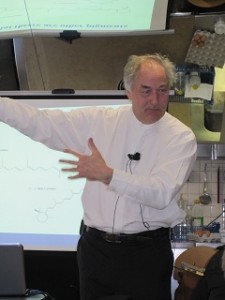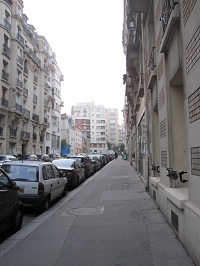What colour is an egg white?
Really. What colour is an egg white?
This was the first question we are asked by Dr. Herve This. Father of Molecular gastronomy.
Confession. I had never heard of him before. For many in my class, seeing Dr. This on the agenda was what really put them over the edge, and made them want to join this course. A physical chemist, he worked with Nicholas Kurti from Oxford to publish the first ever works on molecular gastronomy in 1990. Ferran Adria was probably still in school. Turns out, he was a major force in actually creating the diploma we are all working so hard to get, has published many books including “Cooking is love, art, technique”, and was the founding director of the Food Science and Culture Foundation at the French Academy of Science. The guy is completely brilliant and totally engaging. To me, anyway, a (previous) closet molecular gastronomy naysayer.
You just know you can’t answer his question correctly. We all sheepishly answer quietly…”ummm…white?”
“It’s a very good thing you are all here – in school!”
“You sir,” he says approaching a fellow from Hong Kong. “How old are you?”
“40?” the student sort of answers, yet in the form of a question.
“And let’s just say, that on average you have seen one egg every day of your life. That would mean that you have seen 14,600 eggs in your entire lifetime. True?”

“Yes?”
“And so, please tell me , what colour is an egg white?”
“White? Or ummmmm clear? Maybe? Sort of?”
“Find me an egg!!!” Herve commands. He cracks an egg with one hand into a wine glass, reserving the yolk in the shell.
He holds up the glass for us all to see.
“And now, please, tell me….WHAT COLOUR IS AN EGG WHITE???”
“Yellow!!!!!” the student from Hong Kong declares assuredly with the rest of us chiming in – so proud we know the right answer to the question.
“And this. This is why every day we must ask ourselves why we think like we do. Why we do what we do. Is the sky blue? But why is it blue? We must challenge. We must see things for what they are, even if we have seen them 14,600 times.”
He explains further.
We used to get places on foot, by horse. And now planes.
We used to communicate in person, in writing with pen and paper. Computers and cell phones have changed all that.
We still cook in pots – same as used in twelfth century. Still cook in ovens, same as fifteenth century. Why no evolution? Why has everything moved on in our world except how we cook? Why not cut an onion with a scalpel instead of a knife? Why not cook your food in the dishwasher with steam, while you clean your dishes?
Innovative thinking. Challenging. Brilliant.

